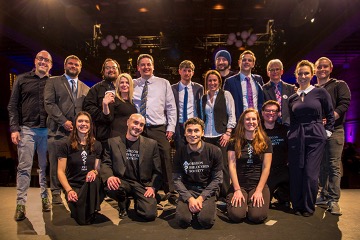- The Oregon Model: Origins and Inspirations - April 1, 2022
Hello, New York. It’s been quite a trek to find myself here, at Horizons, after all these years. Feeling grateful to be here, grateful to provide this dispatch from the Great Pacific Northwest. It’s hard to believe that only a year has passed since we sailed to a historic election night victory with the passage of Oregon’s Measure 109, setting the stage for the nation’s first statewide psilocybin services program. I won’t forget the look in my late wife Sheri’s eyes as those closing poll numbers first flashed onto the screen, the culmination of our five-year effort together.
It’s even harder to believe that just a month and a half later, I lost my beloved wife, and the movement lost a pioneering hero in Sheri Eckert. Since Sheri’s passing, I’ve learned to forge on – we all have – in her honor. I now find myself chairing a Governor-appointed Psilocybin Advisory Board… I’m honored to work with esteemed colleagues on the Board and with the Oregon Health Authority, including Angie Allbee, who you will hear from shortly, as we work hard to support the development of Oregon’s statewide program, set to roll out in 2023.
Join us for our next conference!
The origin story of the Oregon campaign takes us back to 2015, well before any psychedelic policy reform movements had popped up around the country.
The origin story of the Oregon campaign takes us back to 2015, well before any psychedelic policy reform movements had popped up around the country. That’s when Sheri and I began writing the text of the initiative and launched the campaign that would eventually become Measure 109. Honestly, nobody thought success was possible back then, perhaps including us, which was why we aimed for 2020, even though 2020 seemed a distant horizon at the time. We gave ourselves a long runway because we wanted to do things right. We wanted to let the science develop, public opinion evolve, and coalitions coalesce over time. And all of that eventually happened.

Photo of Sheri Eckert. Source: Tom Eckert
Thinking back to the very beginning, I remember reading an article by Michael Pollan in the New Yorker, called The Trip Treatment, which came out well before his bestselling book on psychedelics. While I was a lifelong psychedelic enthusiast, the article, and the whole renaissance of research it illuminated, was a revelation to me. As a psychotherapist, it left me feeling like I wanted to focus my professional attention on psychedelics. I clearly wasn’t alone in feeling that way.
But, of course, there was no available specialty, no track, no way to legally practice outside the research itself. We were all blocked by the law, as had been the case for my entire life.
I knew Sheri had also read the Pollan article, so I shared how I was feeling, and learned that she felt much the same. So, we talked. And the more we talked, the more convicted we became in wanting to help end this prohibition on psychedelic healing.
I do remember the moment when the ballot initiative concept came to my mind. It felt a little like catching lightning in a bottle. It was an odd feeling to realize, having done some googling afterwards, that nobody had ever talked publicly about doing something like that, anywhere in the world. I had to sit with it, as did Sheri. We didn’t take the decision to move forward lightly. We didn’t want to jeopardize progress in any way. We understood the history, and how fragile it all seemed.
We sat on it for a week, feeling undecided, and a bit anxious… until we realized there was only one thing left to do. Consult the mushroom.
We sat on it for a week, feeling undecided, and a bit anxious… until we realized there was only one thing left to do. Consult the mushroom. Inspired, we packed up the car, plucked some Golden Teachers from our little terrarium in the closet, and headed out camping – figuring that a mushroom trip might clarify our decision.

So it was that a mushroom journey, on a beautiful evening surrounded by the majesty of Mother Nature, officially sparked the nation’s first psychedelic campaign. Our setting couldn’t have been better: an old growth forest of giant Hemlocks and Firs at the foot of Mount Rainier in the beautiful Pacific Northwest. As the ancient forest went dark, the Golden Teachers came alive. In the latter stages of a powerful trip, we found ourselves sitting across the campfire. It was somewhere in that starry soup of shared consciousness that we “conceived.”
I remember first having been quiet for a time. My mind had stretched to a frame that felt a thousand years wide. I sensed a deep future, as if historians of some distant day were peeking back at me through a fold in time, which seemed eerily plausible in my altered state. I wondered what they saw? What will the scholars of a truly advanced society, one that survives a thousand years into the future, think about our civilization? What would they see?
My sense was that they weren’t focused on our politics or technologies or anything like that. I sensed them noticing our consciousness, our lost connection with our inner dimensions, the inner sanctum. It was clear to me, in that moment, that consciousness would define our collective future. And perhaps nothing would appear as vexing to these future scholars as the criminalizing of safe and effective means to enhance and explore consciousness, namely the psychedelics.
It was then that Sheri’s voice pierced the quiet.
“I’m pregnant,” she whispered, as if channeling from afar.
It was a curious thing to hear, especially since we were unable to have kids together. I looked at her inquisitively.
“This idea, this campaign, this vision, will be our baby,” she said, with flames reflecting in her dilated eyes. “We’ll raise it like a child. We’ll care for it, until it grows strong.”
And suddenly I knew we would do just that, and that we’d see it all the way through.

Discover the Indigenous Reciprocity Initiative of the Americas
And that, we did. The metaphor held throughout; it’s the way we talked about the campaign, and it’s the way I still think about the statewide program today. Except now it’s truly a village raising the baby, sharing the responsibility of bringing this idea into the world. And, as I share all this with you, I can’t help but feel like I’m dropping our baby off at college… entrusting all of you to see and feel this potential, to help it grow into itself, into the world. I am humbled and proud, and thinking of Sheri, as she truly believed that the world would one day open to the Oregon Model of psychedelic care.
The heart of the Oregon Model is found in the inspirations that gave rise to it. It’s a particular approach, and philosophically founded. Of course, as therapists, we wanted to harness the power of psilocybin for healing, and to help address the mental health crisis in Oregon. We also wanted to end a 50-year prohibition on psychedelic therapy.
But, just as importantly, we wanted to think deeply about how to integrate psychedelics like psilocybin back into the culture. We wanted to put psilocybin therapy and wellness on its own foundation, give it its own licensing framework, and a truly integrated platform, one capable of addressing a spectrum of concerns, from prevention and wellness to therapy and medicine. We wanted to advance a model tailored to the unique quality of the psilocybin modality, and all it entails, which, as you know, is quite a lot.
The Oregon Model represents a shift from a more prescriptive, medicalized approach, toward a more holistic, therapeutic, and humanistic model, a model that fully orients to our inner resources, our innate capacity to grow and mature and even transcend. It’s a model that centers the healing energies squarely within, while connecting us to something greater than ourselves. Out on the campaign trail, Sheri and I quickly found that the culture was ready to embrace that kind of message, because it’s empowering and it’s true, and it speaks to everyone equally.

Part of our understanding as a campaign, and as a statewide program now in development, is that psilocybin is not just a pharma drug; it’s not just a new antidepressant to be brought to market. We see it more through a lens of what I think it really is – an existential, psychospiritual medicine, and, most essentially, a real and vulnerable human experience, unique to the individual, yet deeply rooted in our collective nature.
After all, this is the mushroom. It’s been around forever. As you all know, indigenous cultures have, in different parts of the world, used psilocybin and other plant medicines in ceremonial contexts for hundreds, if not thousands of years. And, to boot, we’ve been studying psilocybin here in the US since the 50’s. So, this is not some new drug; it’s part of a very expansive, collective heritage.
Access to psychedelic plant medicines cannot be restricted to a medical complex.
So, for lots of reasons, we didn’t want to hand this over to a strictly medicalized, prescription-based, pharma-driven psychiatric model. With all due respect – and so much is due – to the heroic scientists that essentially rebirthed the psychedelic movement in the 21st century, the FDA approval process cannot be the sole source of progress, nor can it exclusively define this container. Access to psychedelic plant medicines cannot be restricted to a medical complex. Psilocybin, and the deeply human experience it activates, will not be dominated by pharmaceutical companies.
A bulwark is the ballot initiative, which Oregon proved by carving out a new space for a therapeutic and wellness model that includes careful safety, practice, and ethical standards, with a backbone of specific training and accountability, while opening doors of access to anyone who might safely benefit, without needing a prescription or a diagnosis.
Oregon is showing what is possible here. The measure is an example of creative legislation, in that we used legal language and “people power” to carve out a new space in our culture. And we hope this cultural space expands and proliferates and helps to create a new narrative around mental healthcare nationally. We are so proud of Oregonians who came out in force to support this Measure, all 1.3 million of them who voted “yes” for psilocybin therapy, carrying Measure 109 to a decisive and historic victory with a commanding 56 percent of the statewide vote… something that would have seemed unthinkable just a few short years ago.
In honor of Sheri’s legacy and vision, we launched the Sheri Eckert Foundation to support equitable access to psychedelic education and services, via scholarships and subsidies.
If I may, I’d like to finish by mentioning another related project that is dear to my heart. As you’ve now gathered, Sheri was the co-creator of Measure 109, and had a very clear vision for its implementation. In fact, she communicated a clearly worded wish to develop an institution that, “guided by on-the-ground community leaders, would allocate resources to support facilitator training, community education, and service delivery for often underserved populations in Oregon.” In honor of Sheri’s legacy and vision, we launched the Sheri Eckert Foundation to support equitable access to psychedelic education and services, via scholarships and subsidies. Please do get in touch with me if you would like to support the mission. You can learn more about it at sherieckert.org.
And with that, I’ll make way for Angie Albee of the Oregon Health Authority, who has been a big inspiration to me and a wonderful collaborator. Angie is going to tell you a bit more about the current state of the program, in terms of its development and implementation, and all the hard work they’ve been doing to make the Oregon Psilocybin Services Program the very best it can be.
Thank you all for taking the time to listen and thank you for supporting Oregon over the years. I deeply appreciate it.
—
Note:
This lecture was originally presented at Horizons conference in New York City on December 4th, 2021.
Take a minute to browse our stock:
Did you enjoy reading this article?
Please support Chacruna's work by donating to us. We are an independent organization and we offer free education and advocacy for psychedelic plant medicines. We are a team of dedicated volunteers!
Can you help Chacruna advance cultural understanding around these substances?

















